mardi, 01 août 2017
Dissemination, migration and geoconstructivism in XXI. Century
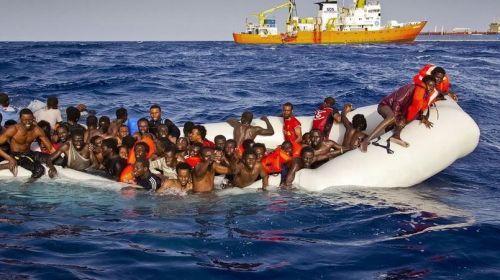
Dissemination, migration and geoconstructivism in XXI. Century
Memory speech by Jure Georges Vujic, director of Institute for geopolitics and strategic research, Zagreb
At internation conference “ Europe and Migration in the 21st Century“ Zagreb, Croatia, 11-12.05.2017
The contemporary migration phenomenon is too often analysed and viewed as a sui generis phenomenon through the security and humanitarian optic. However, since I engage in geopolitics, my exposition will attempt to view migration flows as a means, object or factor of power, or a correlative interaction between political power and a certain indigenous population and migrating population in a given space and in a certain social context and time.
Bio-politics and contemporary migration
It is well known to everyone - the papers by sociologist Michel Foucault on this subject are attached - that political power is also a kind of bio-power or power over bodies through controlling and managing the population. [1] It is often a matter of biopolitics practiced not only on human communities, but also on the social environment, conditions of life, health of a nation, demography, on birth-rate and on age. Considering that biopolitics does not deal with the classical power that is practiced on a confined territory, but the one that is practiced on populations, it is clear that migration, migration flows on a global level became the means for a new form of geoengineering.
Geoconstructivism is applied social engineering to peoples, states and geographies, or to the geopolitics that can rightfully be called geo-engineering. Social engineering is a method of social management that treats society as an object that needs to be controlled, formatted, constantly modelled, and managed, as in informatics or genetics. It is about modifying and mechanizing the natural and organic development of society for political and economic purposes. It is about eugenics transposed into the area of social control and cybernetic manipulation. The social engineering with a scientific base in the cybernetic works by Norbert Wiener, Kurt Lewin, Pavlov, Skinner, Albert Bandura, Gregory Bateson, today is the usual practice of the working and economic world, the world of consulting, management, military intelligence and information technology. Contemporary neoliberal capitalism and financial oligarchy are artfully using social engineering methods today, like Edward Bernay, Milton Friedman (shock strategy), and Zbigniew Brzezinski (Tittytainement strategy) to expand their financial and economic sphere. In the field of geopolitics, the same approach to manipulation, modelling and formulation is applied to a certain strategic, strong geoenergy area in which peoples, cultures, identities, boundaries are just objects and elements to reshuffle and compose "higher" interests and plans, so it is no wonder that the results of such geoconstructivist figments are the emergence of inter-confessional and inter-ethnic conflicts and new wars, and the emergence of hybrid unstable artificial quasi-state entities or protectorates.
The key strategy of contemporary social engineering is the shock testing strategy, shock testing as a complementary method of the shock strategy of the capitalism. It is all about inducing social and economic shocks (disturbances, destabilization) without the same shocks destabilizing those who have conceived such a strategy. In order for such a strategy to succeed, it is necessary to pursue systematic social de-solidarization by creating a variety of mental and social types of apartheid, fragmentation processes, dislocated spaces, so that the richer classes could continue to get richer at the expense of the poorer marginalized classes, without major social disturbances. In the field of geopolitical engineering, the same shock strategy is being pursued by spreading induced chaos, ethnic-religious division and fragmentation, deconstruction of stable state structures, spread of fear and false alarming information (info war) through psychological warfare operations, etc ...
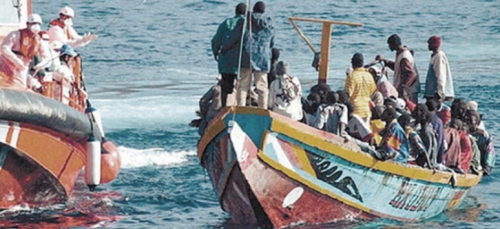
It is the reign of constructive chaos; Joseph Schumpeter spoke of the survival and evolution of modern capitalism in the form of creative destruction. All of today's geopolitical conflicts and wars from Central Asia through Africa to the Middle East are a product of geoconstructivism that through destruction and chaos seeks to maintain and expand the global hegemony of market capitalism and liberal democracy. It is the reign of constructive chaos
From geoconstructivism to geo-engineering
Geoconstructivism has its roots in the enlightenment and rationalist aspirations in the 18th century, which held that societies and states can be mechanically and constructivistically built, transformed and artificially deconstructed. The mechanistic perception of the world and societies that can be constructed, dismantled and transformed like Lego bricks, derives from the constructivist epistemology. Consequently, geoconstructivism as a concept is the transposition of the thesis of constructivist philosophy in the geopolitical field. Namely, in line with the geopolitical works by Saul Cohen, the great powerful geostrategic economic world regions, certain regional and world sovereigns seek to formulate, in the form of a mechanistic and artificial geoconstructivist approach, the regrouping of certain central powerful world regions within the framework of a new geopolitical regional whole, to control the resources or stabilize grey zones or peripheral unstable chaotic "rimland" of Brzezinski's "chessboard", quite particularly in the regions of Central Asia and the Middle East. In this context, these regions have been transformed into a large experimental geopolitical laboratory in which geographic and geoeconomic parcelization and division in the service of geoenergy networks is being implemented without taking into account the living and natural parameters of political geography of space, relations and influence of cultural environment, articulation between territorially specific morphogenesis and ethno genesis, and the specifics of local national powers. For this reason, such experimental geoconstructivism will inevitably meet with certain religious, national, ethnic or other resistance because it is mechanistic-constructivist in its nature and it does not respect organic-historical continuums and natural-temporal spatial categories, which in the context of the Middle East certainly spells a period of new clashes and geopolitical turbulences.
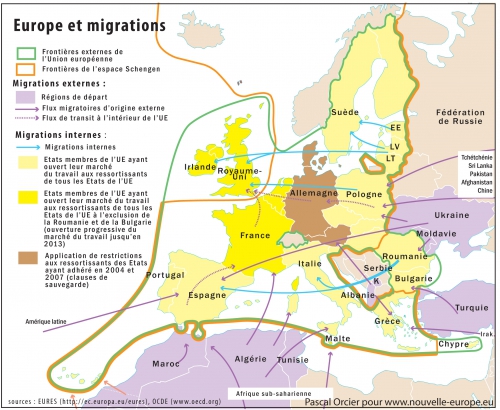
Population and migration of substitution
In the field of demographic science, migration of substitution is a necessary and encouraged ("induced") migration to allow a society, a national community to achieve a more favourable structural demographic, economic or social target. Such migrations are often legitimized with the argument of the demographic aging of the population or active population fit for work. This, generally, involves demographic projections that, however, should not be seen as official mandatory recommendations or requirements. From the scientific aspect, migration of substitution can take different forms depending on demographic projections: "migration of minimum substitution" and "migration of constant permanent substitution". Such a migration model can thus be a very effective weapon in controlling and managing populations, especially as a means of geo-engineering, depending on where the migrations start from and in what directions they move (and in what numbers) and what kind of migration policies (restrictive or liberal ) they fit in. In the former case, it is a minimum migration without surplus to achieve the demographic target: for example, a controlled migration that should prevent the demographic decline and aging of the population (in Quebec), while in the latter case it is a migration of the constant migration rate that is permanent throughout the given Demographic projection periods
That the migration phenomenon can be instrumentalized to encourage the demographic substitution of the indigenous population speaks for the claim of demographic expert Michele Tribalat who points out how "the convergence of the increase of the young people of foreign origin and the decline of the young population of indigenous origin opens the way to the process of demographic substitution." This phenomenon of democratic substitution is evident with the change of demographic configuration and structure in western European societies: in the cities where the periphery is dominated by ethnic immigrant enclaves, with the phenomenon of urban segregation and secession, the introduction and application of urban micro-levels of ethnic-religious law (Islamic Sharia Law) which is in contradiction with the law of the receiving country.
It is worth mentioning the demographic and immigration projections of the Bilderberg Group, which sets as its global goal the freedom of immigration and emigration, as well as the limitation of state sovereignty through the transfer of the state authority to a supranational body (UN). In the 1993 report of the Trilateral Commission ("International Migration Challenges in a New Era") it is clearly stated that "Europe should become land of immigration and promote integration of immigrants by promoting public debate to create a general democratic consensus. It is also indicative that they keep statistics based on the "ethnic key" otherwise prohibited as statistical methods in Western Europe.
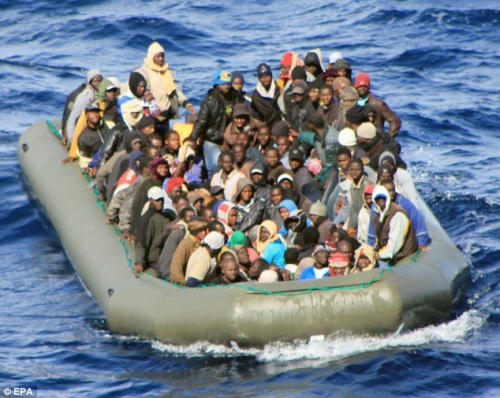
To address such demographic dysfunction, the UN in their report about "migration of substitution" (UN Population Fund) have proposed migration of substitution as a solution, a planned immigration to Europe that should replace the aging and declining indigenous population with the young migrant workforce from the Third World.
It should not be forgotten that the international bodies and the global financial and economic decision-making centres are thinking only in quantitative terms, in figures and added values; Population structure, cultural identities and differences are thought and treated only in economic terms and must serve the imperatives and de-regulative dynamics of the unified global market. Thus, it must be remembered that the United Nations openly speak of migrations of substitution. For example, the Population Division of the Department of Economic and Social Affairs published a report entitled Migration of substitution: Is it a Solution to Declining and Aging Populations? The concept of migration of substitution corresponds to the international migration that a country would need to avoid the decline and aging of the population resulting from low fertility and mortality rates. In each case, different scenarios are considered for the period 1995-2050, highlighting the impact that different levels of immigration would have on the size and aging of the population.
Post-nationality and "Dissemi-Nation" migratory
Yet, despite the failure of integrationist policies and the model of multiculturalism, there is every reason to believe that for decades people have been conditioned and prepared to think in terms of post-nationality, migration management and humanitarian migratory disaster, cultural and identity migratory hybridization. This post-national discourse is now reactivated for geopolitical and social engineering purposes, drawing on its sources in the classical post-colonial discourse cherished by Frantz Fanon and Edward Said, who in the 1960s -1970 attacked the modes of perception and the representations of which the colonized were the object. Indeed, under the influence of post-structuralist, neo-Marxist and deconstructivist thought, the most famous of which are Foucault, Derrida and Deleuze (the famous French theory which, under the name of French theory, would considerably influence the university elites of American scholars through cultural studies and subaltern studies), the globalist Atlantic elites in Europe participated to a great extent in the legitimization of the post-national and pro-migratory discourse.
The ambient mode of post-nationality, the apology of the beneficial virtues of mixing and cultural hybridizations have profoundly altered the relationship and perception of the role of the frontier in the Western mind, whose function of limit and separation has been systematically denigrated, in favour of the conception "border contact", place of hybridization and exchanges and cultural encounters. This irenic state of mind explains the irresponsible declarations of the European elites in the face of the massive migratory wave who from the register of human rights and humanitarian law wielded the imperative to welcome immigrants who were crossing over through the Channel Tunnel or trampled down border protection barriers. This attitude, which all too often forgets that the majority of migratory flows have essentially economic, social and pecuniary causes and motivations, also explains the dominant will to discredit, even demonize, the proposals of reinforcement and control at the borders by lambasting "Fortress Europe", with wall construction projects in Hungary being labelled as segregationist models.
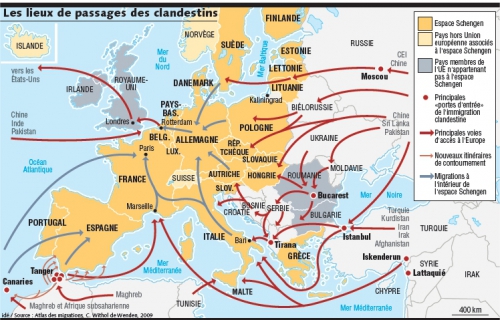
The globalist and post-national discourse corroborated by the guilty mind of post-colonialism believes that the nation, as a reference to national and historical identity, would be an obsolete entity, an inadequate and historically consumed territorial category, substituted by new cross-territorial, hybrid and fluid constructions with ill-defined contours. Migratory dissemination and dispersal on a global scale would spearhead this nation's liquidation, as an ethnic and linguistic entity, a vector of national and historical identity. The proliferation, dispersal and export of large masses of non-European migrants resemble a process of migratory dissemination, which in the long run could well destabilize what still remains of the old European nations, with the migratory play of the strategy of the "Great Replacement" evoked by Renaud Camus. Massive migratory dissemination would then be a weapon of internal and massive decimation of the nation.
Notes
Norbert Wiener, Cybernetics: Or Control and Communication in the Animal and the Machine. Paris, (Hermann & Cie) & Camb. Mass, 1948.
Renaud Camus, Le Changement de peuple, chez l'auteur (2013), Le grand remplacement, Broche, 2011.
Joseph A. Schumpeter. Capitalism, Socialism and Democracy (New York: Harper, 1975)
- Shaw; "Postnational constitutionalism in the European Union"; Journal of European Policy (1999)
Michele Tribalat. Les Yeux grands fermés : L'Immigration en France, Paris, Denoël, mars 2010.
François Cusset, French Theory: Foucault, Derrida, Deleuze, & Cie et les mutations de la vie intellectuelle aux États-Unis, éd. La Découverte, Paris, 2003.
Joseph Turow, Media Today: An Introduction to Mass Communication. (New York, New York: Routledge, 2011).
Larry Tye, The Father of Spin: Edward L. Bernays and The Birth of Public Relations. (Picador, 2002)
Roberto Esposito (2008). Bios: Biopolitics and Philosophy. U of Minnesota Press.
Michel Foucault: Security, Territory, Population, Editors: Davidson, Arnold I. 2007.
Michael Hardt and Antonio Negri (2005). Multitude: War and Democracy in the Age of Empire. Hamish Hamilton.
***
Organisation : Centre for Croatian Diaspora Studies, Zagreb
Institute for Migration and Ethnic Studies, Zagreb
Croatian Institute of Social Sciences Ivo Pilar, Zagreb,
IMIN
Topics and panels:
The Impact of Syrian Refugees on the Turkish Economy
Oğuz Esen - Turkey / Izmir university of economics
(Un) belonging and Identity: Turks in Germany
Gul Ozyegin - USA/ College of William and Mary
Attitudes Towards Immigrants Among Youth in Sweden
Beint Magnus Aamodt Bentsen - Sweden / Malmö University
Should I stay or should I leave? Latvian and Romanian Youth in Sweden.
Carolina Adolfsson - Sweden / Malmö University
Climate Change Fuel Conflict, Poverty, Migration and Lack of Development- Managing the Unavoidable
Natthani Santini - University of York, UK
Sandeep Roy - Department of Psychology, University of North Texas
Cultural Component of Migrants Living in the Volga Federal District of the Russian Federation
Almaz Choloian - Volga Migration Center, Russia
The Role of the Host Local Population in the Process of Migrants’ Adaptation
Vsevolod Konstantinov - Penza State University, Russia
Exploring transnational entrepreneurship among Albanian migrants and returnees
Joniada Barjaba - University of Sussex, UK
Migration and dual city. Some basis for the study of the ambivalent dynamics of immigrants’ social inclusion - exclusion in European
Kayamba Tshitshi Ndouba - Universidad Internacional de la Rioja- UNIR, Spain
10:31 Publié dans Actualité, Géopolitique | Lien permanent | Commentaires (0) | Tags : actualité, politique internationale, migrations, immigrations, réfugiés |  |
|  del.icio.us |
del.icio.us |  |
|  Digg |
Digg | ![]() Facebook
Facebook
La guerre froide du gaz et les inacceptables sanctions des États-Unis contre l’Europe!
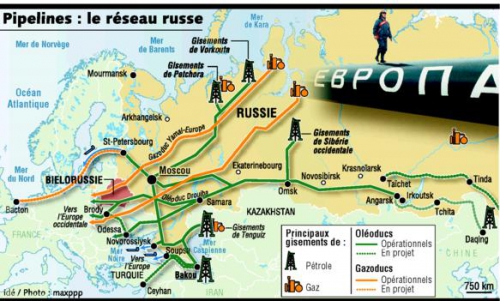
La guerre froide du gaz et les inacceptables sanctions des États-Unis contre l’Europe!
Marc Rousset
Ex: http://synthesenationale.hautetfort.com
Que ne feraient pas les États-Unis pour exporter leur gaz de schiste nouveau et contrer la puissance stratégique de la Russie aussi bien en Europe qu’au Moyen-Orient !
Le russe Gazprom (Газпро́м) veut construire un nouveau gazoduc (Nord Stream 2) de 9,5 milliards d’euros dans la Baltique, qui augmenterait d’un tiers en 2019, soit de 55 milliards de m3, le gazoduc sous-marin Nord Stream 1 déjà existant entre Vyborg (Выборг, Russie) et Greifswald (Allemagne).
Suite à l’opposition de l’Ukraine et de la Pologne, dont les gazoducs continentaux Yamal et Brotherhood passant par leurs territoires sont court-circuités, Gazprom a été amené à être le seul actionnaire du projet. Le français Engie, les allemands Uniper (ex-E.ON) et Wintershall (BASF) ainsi que l’anglo-néerlandais Shell ont décidé d’être seulement des financiers à hauteur de 10 % chacun, et non plus des actionnaires, ce qui était initialement prévu. Nord Stream, passant sous la mer, échappe à la juridiction de Bruxelles ; les Allemands considèrent ce projet comme strictement commercial.
L’Europe ne peut, au contraire, que se réjouir de diversifier son approvisionnement en gaz naturel pour 40 % en provenance de la Russie, pays frère continental européen, d’autant plus que la production chute au Royaume-Uni (mer du Nord) et au Pays-Bas.
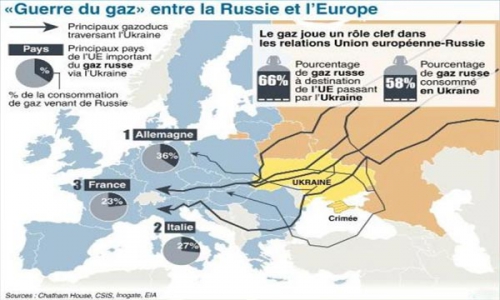
La folle agressivité américaine se comprend d’autant mieux que la Russie, suite à son intervention victorieuse en Syrie, est devenue le maître du jeu au Moyen-Orient pour le gaz en provenance du Qatar et d’Iran. Le projet « Turkish Stream » prévoit la construction en Turquie par la Russie de deux conduites d’une capacité de 15,75 milliards de m3 par an chacune, qui formeront un gazoduc sous la mer Noire, évitant encore une fois l’Ukraine, pour fournir l’Europe. Le Qatar a dû passer sous les fourches caudines russes et renoncer au projet initial « sunnite » évitant l’Irak, passant par l’Arabie saoudite et une Syrie non Bachar el-Assad. La Russie devient le pivot central pour que le gaz tant iranien que qatari transite vers l’Europe sans déposséder Moscou via le futur gazoduc russo-turc « Turkish Stream ». À quand une Europe européenne et enfin libre ?
Boulevard Voltaire cliquez ici
10:13 Publié dans Actualité, Affaires européennes, Géopolitique | Lien permanent | Commentaires (0) | Tags : géopolitique, russie, europe, états-unis, actualité, politique internationale, hydrocarbures, gaz russe, gazoducs, énergie |  |
|  del.icio.us |
del.icio.us |  |
|  Digg |
Digg | ![]() Facebook
Facebook
Roland Gaucher, le forcené de l’anti-communisme… décédé il y a dix ans
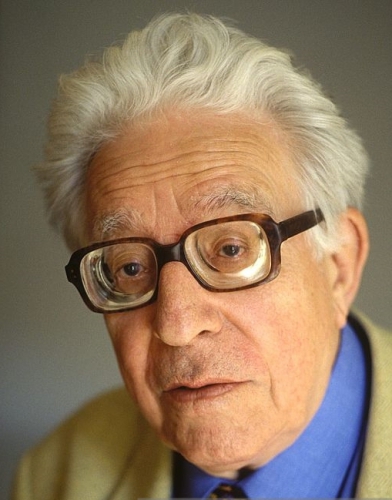
Roland Gaucher, le forcené de l’anti-communisme… décédé il y a dix ans
Il y a dix ans, décédait Roland Gaucher. Nous reproduisons ici l'article paru dans le n°5 de la revue Synthèse nationale (automne 2007) :
par Roland Hélie
Ex: http://synthesenationale.hautetfort.com
Le 26 juillet, nous avons appris avec tristesse la disparition de Roland Gaucher.
Agé de 88 ans, Roland était né en 1919 à Paris. Il était prédestiné au journalisme puisque son père exerçait déjà cette profession. En revanche, rien, dans sa jeunesse, n’indiquait qu’il deviendrait plus tard l’un des piliers du combat pour la cause nationale. Son premier engagement politique, dans les années 30, l’avait en effet conduit dans les rangs de l’extrême gauche. Trotskiste d’abord, il milita à la Fédération des étudiants révolutionnaires et aux Jeunesses socialistes ouvrières. Il se rapprocha en 1937 du courant animé par Marceau Pivert qui donnera naissance à l’éphémère Parti socialiste ouvrier et paysan. C’est à cette époque que Roland Gaucher, de son vrai nom Roland Goguillot, rencontra Marcel Déat qui, par esprit pacifiste, se rangera dans le camp de la Révolution nationale. En 1939, il fut mobilisé dans l’infanterie et il sera fait prisonnier par les Allemands à Rennes. Un an plus tard, il s’évadera lors de son transfert en Allemagne. Marcel Déat créa en 1941 le Rassemblement national populaire qui regroupait de nombreux militants issus de la SFIO et des différents partis de gauche. Roland Gaucher, qui était revenu à la vie civile, fut de ceux-ci, c’est à ce moment là qu’il rompit définitivement avec sa famille d’origine. De son voyage initiatique à la politique au sein de la gauche révolutionnaire, Roland Gaucher gardera une solide formation qui fera de lui plus tard l’un des spécialistes les plus avisés du marxisme. Il conservera aussi un formidable sens de l’agit-prop qu’il mettra, le moment venu, au service de la droite nationale.
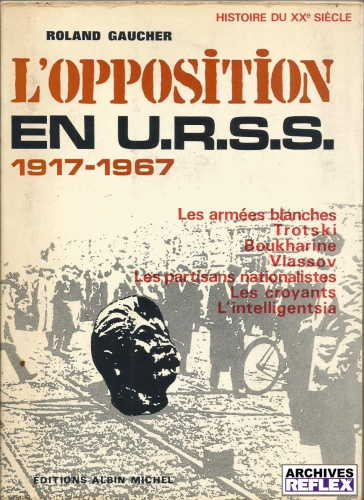 Après la guerre, il connut des moments difficiles. Il fut condamné à cinq années de prison, mais il fut libéré en 1948. Devenu journaliste professionnel, il collabora à plusieurs revues spécialisées parmi lesquelles l’Auto-journal. Mais le sens du devoir conduisit Roland Gaucher à reprendre le combat. Il travailla un temps pour l’Institut d’histoire sociale et pour la revue Est et Ouest, deux émanations de ce que l’on appelait alors pudiquement « les réseaux Albertini » (1). Il participa à la lutte en faveur de la défense de l’Algérie française. Après l’échec de ce « baroud pour l’honneur », il devint grand reporter à l’hebdomadaire Minute où il restera plus de vingt ans. Parallèlement à son engagement journalistique, il prit une part active, au cours des année 70, à l’action sur le terrain contre le Parti communiste qui représentait un véritable danger pour notre liberté. Il participa en 1972 à la création du Front national et, en 1974, il rejoignit le Parti des forces nouvelles dont il devint l’un des principaux dirigeants. La même année, il publia une monumentale Histoire secrète du Parti communiste français (chez Albin Michel) qui fit grand bruit et contribua, à n’en pas douter, à la déstabilisation et à la marginalisation de ce parti alors encore tout puissant.
Après la guerre, il connut des moments difficiles. Il fut condamné à cinq années de prison, mais il fut libéré en 1948. Devenu journaliste professionnel, il collabora à plusieurs revues spécialisées parmi lesquelles l’Auto-journal. Mais le sens du devoir conduisit Roland Gaucher à reprendre le combat. Il travailla un temps pour l’Institut d’histoire sociale et pour la revue Est et Ouest, deux émanations de ce que l’on appelait alors pudiquement « les réseaux Albertini » (1). Il participa à la lutte en faveur de la défense de l’Algérie française. Après l’échec de ce « baroud pour l’honneur », il devint grand reporter à l’hebdomadaire Minute où il restera plus de vingt ans. Parallèlement à son engagement journalistique, il prit une part active, au cours des année 70, à l’action sur le terrain contre le Parti communiste qui représentait un véritable danger pour notre liberté. Il participa en 1972 à la création du Front national et, en 1974, il rejoignit le Parti des forces nouvelles dont il devint l’un des principaux dirigeants. La même année, il publia une monumentale Histoire secrète du Parti communiste français (chez Albin Michel) qui fit grand bruit et contribua, à n’en pas douter, à la déstabilisation et à la marginalisation de ce parti alors encore tout puissant.
C’est à l’occasion de la sortie de ce livre que je le rencontrai pour la première fois, lors d’une conférence organisée à La Rochelle par la section locale du PFN. Participaient aussi à cette réunion François Brigneau, autre pilier de Minute, et Henry Charbonneau, l’auteur des Mémoire de Porthos (2). C’est dire que, ce soir-là, le jeune militant que j’étais fut comblé.
Chaque mois, Roland Gaucher menait dans les pages de la revue Initiative nationale, le magazine du PFN, une véritable croisade épistolaire contre le communisme. Croisade épistolaire dûment accompagnée de campagnes militantes au cours desquelles un grand nombre de camarades toujours en activité aujourd’hui ont acquis un savoir-faire inégalé. Toujours prêt à en découdre, ce combattant infatigable n'hésitait jamais à foncer en première ligne face à nos adversaires. Il n’hésitait pas non plus à faire le coup de poing si cela s’avérait nécessaire. Ceux qui étaient présents à Paris en juin 1977 lors de la venue du bourreau soviétique Léonid Brejnev gardent en mémoire la formidable riposte organisée par les nationalistes et en grande partie suscitée par ce « vieux forcené de l’anti-communisme » (l’essentiel des militants avait moins de 25 ans et lui en avait déjà plus de 50, c’est pour dire) que nous suivions avec entrain et confiance.
 Roland était devenu la bête noire des communistes. Dans Minute, chaque semaine, il ne manquait jamais une occasion de mener la vie dure au parti de Moscou. C’est ainsi qu’il fut le premier à rappeler l’engagement volontaire, alors que la France était occupée, de Georges Marchais dans les ateliers de la firme Messerschmitt, principal constructeur d’avions de l’Allemagne nationale-socialiste. Marchais fondit en larmes lorsqu’il perdit le procès qu’il avait engagé contre Gaucher. Ce fut le début de la fin de sa carrière. Dans un hommage publié dans le quotidien Présent du 11 août dernier, le journaliste Jean Cochet nous rappelle ce que Roland lui avait alors confié : « Ces larmes de Marchais, c’est ma Légion d’honneur à moi ».
Roland était devenu la bête noire des communistes. Dans Minute, chaque semaine, il ne manquait jamais une occasion de mener la vie dure au parti de Moscou. C’est ainsi qu’il fut le premier à rappeler l’engagement volontaire, alors que la France était occupée, de Georges Marchais dans les ateliers de la firme Messerschmitt, principal constructeur d’avions de l’Allemagne nationale-socialiste. Marchais fondit en larmes lorsqu’il perdit le procès qu’il avait engagé contre Gaucher. Ce fut le début de la fin de sa carrière. Dans un hommage publié dans le quotidien Présent du 11 août dernier, le journaliste Jean Cochet nous rappelle ce que Roland lui avait alors confié : « Ces larmes de Marchais, c’est ma Légion d’honneur à moi ».
Sa devise face aux communistes était la suivante : « Ne reculez jamais ! ». Elle raisonne encore dans les tympans de ceux qui le suivirent. Dix ans plus tard, le rideau de fer s’effondrait lamentablement lui donnant ainsi, d’une certaine manière, raison.
Mais Roland Gaucher n’avait pas, c’est le moins que l’on puisse dire, un caractère facile. Quelques divergences de vue avec les autres dirigeants du PFN l’amenèrent, en 1979, à s’éloigner du Parti. Il se rapprocha alors à nouveau du Front national qui, organisé d’une main de maître par un autre militant exemplaire, Jean-Pierre Stirbois, commençait son ascension historique. Au milieu des années 80, il devint l'une des figures du FN. Il fut élu député européen de 1986 à 1989. Il créa en même temps National hebdo dont il assura la direction, avec Lionel Payet, jusqu’en 1992.
On se souvient de ses prises de bec avec les responsables du Front (y compris avec son président) lorsqu’il n’était pas d’accord avec telle ou telle décision du Bureau politique. Cette attitude, somme toute assez rare au sein des instances dirigeantes du FN, mérite d’être rappelée.
Fort de sa popularité en tant que directeur de NH, Roland n’hésita pas à défier la direction du FN lorsqu’il estimait que cela en valait la peine. Ainsi, quinze jours après la disparition tragique de Jean-Pierre Stirbois, le 8 novembre 1988, scandalisé par l’inertie d’une partie de la dite direction, il prit l’initiative d’organiser, au Palais de la Mutualité à Paris, une grande soirée en hommage au défunt. Ce fut un immense succès, la grande salle de la Mutu était pleine à craquer. Ce soir-là Roland Gaucher avait réussi à rassembler tout ce que Paris et la Région parisienne comptaient de militants nationaux et nationalistes. Il s’était aussi attiré les foudres de certains hauts dirigeants du Front, et non les moindres, qui ne lui pardonnèrent jamais.
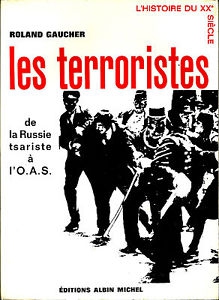 Toujours soucieux de voir un jour se réaliser le véritable rassemblement des forces nationales, Roland Gaucher fut aussi, ne l’oublions pas, au début des années 90, l’instigateur des Journées culturelles de National Hebdo qui rassemblèrent tout ce que le camp national comptait alors de mouvements, associations, journaux…
Toujours soucieux de voir un jour se réaliser le véritable rassemblement des forces nationales, Roland Gaucher fut aussi, ne l’oublions pas, au début des années 90, l’instigateur des Journées culturelles de National Hebdo qui rassemblèrent tout ce que le camp national comptait alors de mouvements, associations, journaux…
En 1993, arriva ce qui devait bien finir par arriver : il s'éloigna du Front, dans lequel il ne se reconnaissait plus vraiment. Il prit la direction pendant quelques années du mensuel (non conformiste) Le Crapouillot. Il se consacra simultanément à la rédaction de nouveaux livres, dont certains en collaboration avec Philippe Randa. Il écrivit aussi une Histoire des nationalistes en France (3).
Nous nous voyions plusieurs fois par an et c'était toujours un plaisir de l'écouter raconter (certes parfois pour la Xième fois, mais qu'importe... c'était Roland) les grandes heures de la presse et du mouvement national. En bon vieux grognard toujours un peu grincheux qu'il était, Roland Gaucher gardait toujours une vision assez réaliste des choses. Surtout, il ne perdait jamais l'espoir de voir un jour notre idéal triompher. Aujourd'hui, Roland n'est plus, mais l'idéal survit.
(Pour Robert Steuckers, Roland Gaucher fut essentiellement le directeur du Crapouillot, figure chaleureuse et paternelle, bonne fourchette, gai convive. Les numéros sur les "nouveaux nationalistes" et sur "la gauche et la collaboration" furent l'occasion de coopérer fructueusement...).

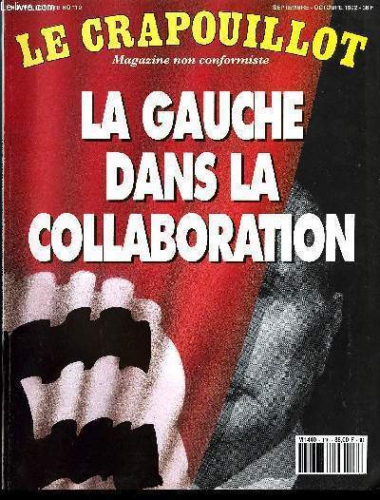
Notes
(1) Du nom de Georges Albertini, ancien chef de cabinet de Marcel Déat, fondateur de ces organisations qui prirent une part active dans la lutte contre le communisme entre 1945 et 1989.
(2) Les Mémoire de Porthos, le roman noir de la droite française (1920-1946) par Henry Charbonneau, 2 tomes, Editions du Clan, 1969. Rééditées en 2001 par les Editions de Chiré (DPF, BP n°1, 86190 Chiré-en-Montreuil).
(3) Histoire des nationalistes en France (1943-1997) par Roland Gaucher, 2 tomes, Editions Jean Picollec 1997.
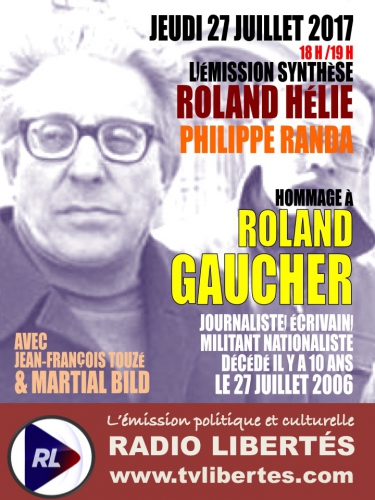
Ecoutez l'émission de Radio Libertés
réalisée en hommage à Roland Gaucher cliquez ici
Radio Libertés cliquez ici
09:55 Publié dans Biographie, Hommages | Lien permanent | Commentaires (0) | Tags : roland gaucher, hommage, france, nationalisme |  |
|  del.icio.us |
del.icio.us |  |
|  Digg |
Digg | ![]() Facebook
Facebook


